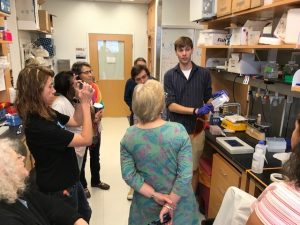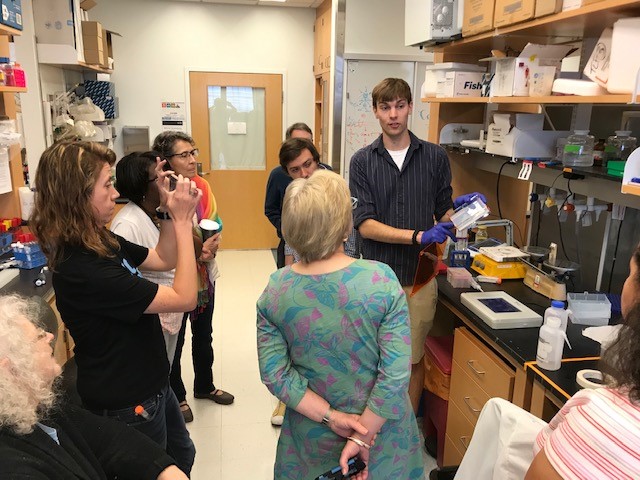Inspired by DNA Day outreach to schools across the country, scientists in the pharmacology department gave its administrative support staff a hands-on chance to learn more about the lab work researchers conduct.

Inspired by DNA Day outreach to schools across the country, scientists in the pharmacology department gave its administrative support staff a hands-on chance to learn more about the lab work researchers conduct.

May 15, 2019
Research!America, an advocacy group for science and discovery, conducted a study showing that four out of five Americans think that research investment is important to job creation and that it is important for scientists to engage with the public on research and its impact on society. Yet 80 percent of Americans cannot name a living scientist.
For many years, student researchers at UNC-Chapel Hill have celebrated DNA Day as a way to educate the public about research and its role in advancing human health. This involved hundreds of university students visiting schools and conducting simple scientific experiments and answering questions about medical research.
This week, the department of pharmacology, which is ranked second in the country in NIH funding, expanded on this effort to involve its administrative staff, which was given the opportunity to participate in their own version of DNA Day. Call it “inreach.” It was led by Matt Begley, the current lab manager for the Dohlman Lab and incoming graduate student who will be part of UNC’s Biological and Biomedical Sciences Program (BBSP) this summer. Student services manager Nicole Arnold helped organize the day.
The morning of Monday May 13 began with a lab experiment Begley led; he gave department support staff a taste of life in the laboratory, including the opportunity to test their sensitivity to a bitter chemical compound as a way to illustrate the type of human variation used to personalize health care. Begley then led the group in an hour-long laboratory exercise to collect and isolate their own DNA, and practice the manipulation and analysis of DNA with liquid-handling equipment and an agarose gel electrophoresis device used to separate and analyze gene fragments. The exercise was followed by a lunchtime discussion focused on how DNA plays an increasingly important role in health and medicine.
“The staff’s work makes my job possible, and it was nice to be able to share a unique experience with them,” Begley said. “We tried to connect the dots of translational research and give the staff a better idea of how their work supports the science happening in the pharmacology department. None of this would have been possible without the resources available from the BBSP’s Science Outreach group, Henrik’s support, or Nicole Arnold’s organization.”
Participants included pharmacology business manager Patty Holloway, purchasing manager Alfred Dolge, chair’s executive assistant Arlene Sandoval, applications technician and web developer Betsy Clarke, accounting manager Tangi Covington, accounting technicians Linda Parson and Ryan Maddux, and Arnold.
Department chair Henrik Dohlman, PhD, helped answer questions about how research benefits society.
“Our support staff works with us daily, but many have spent no time in the laboratories they support,” Dohlman said. “This exercise gave them a better sense of what we do on a daily basis, and will hopefully allow them function as community ambassadors, sharing the work we do at UNC to help understand the causes of disease and to find new treatments.”
Arnold said, “Matt made it easy for us to understand and he made it fun!”
Dolge added he was thankful for the interesting and informative presentations. “For non-scientists, having hands-on work, as well as visual aids, helped give a good tangible and noticeable result to the explanations of the process of DNA separation,” he said. “The pipetting was a good touch to help foster our interest in the results! I think we are now more informed on some of the lab work that the department does.”